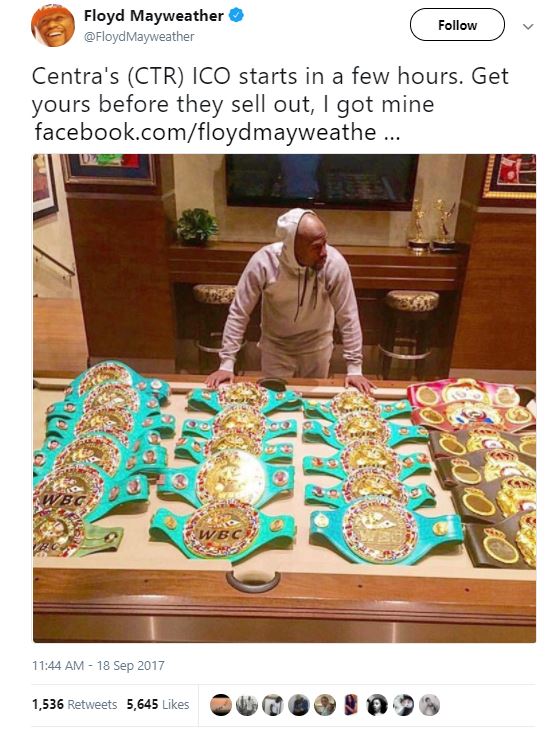Knockout: SEC Charges Floyd Mayweather-backed ICO with Fraud

The US Securities and Exchange Commission (SEC) filed charges against the Centra Tech initial coin offering (ICO) on Monday, alleging that the token sale — which was promoted by legendary boxer Floyd Mayweather — was a fraudulent securities offering.
SEC Halts ICO, Charges Founders with Fraud
The SEC complaint alleges both that the Centra ICO was an unregistered securities offering and that its co-founders “engaged in fraudulent conduct and made material misstatements and omissions designed to deceive investors.”
The Miami-based company — founded by Sohrab “Sam” Sharma and Robert Farkas — raised $32 million through an ICO last year.
According to the SEC, Centra lied about having relationships with large financial institutions — including Visa, Mastercard, and Bancorp — firms which sent Centra numerous cease-and-desist letters.
Additionally several of the executives depicted in Centra’s promotional materials were fictional.
“We allege that Centra sold investors on the promise of new digital technologies by using a sophisticated marketing campaign to spin a web of lies about their supposed partnerships with legitimate businesses,” said Stephanie Avakian, Co-Director of the SEC’s Division of Enforcement. “As the complaint alleges, these and other claims were simply false.”
The SEC initially subpoenaed Centra in February, likely as part of its broad probe into ICOs.
The complaint said that both Sharma and Farkas were arrested on April 1, after the company’s bank accounts had been cleaned out; Farkas, incidentally, was attempting to board a flight leaving the country.
Centra ICO Relied on Celebrity Endorsements
The Centra ICO is perhaps best known for its use of celebrity endorsements to promote its product. Legendary boxing champion Floyd Mayweather — who has made paid endorsements for several ICOs — promoted the token sale on social media, garnering more than 1,500 retweets and 5,600 likes.

In addition to Mayweather, the Centra hired DJ Khaled to promote the ICO, though neither celebrity was named in the indictment.
“As we allege, the defendants relied heavily on celebrity endorsements and social media to market their scheme,” said Steve Peikin, Co-Director of the SEC’s Division of Enforcement. “Endorsements and glossy marketing materials are no substitute for the SEC’s registration and disclosure requirements as well as diligence by investors.”
Notably, the SEC has warned that these celebrity ICO endorsements may be illegal if the parties do not make necessary public disclosures. Mayweather’s tweet advertising the token sale, for instance, does not indicate that it is a paid ad.
Featured image from Shutterstock.